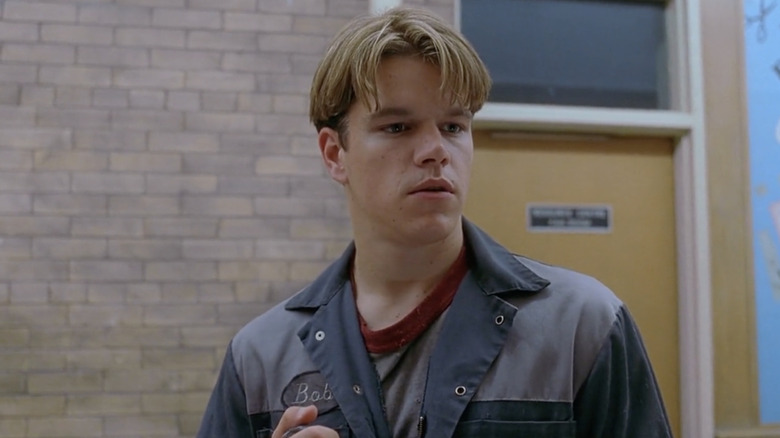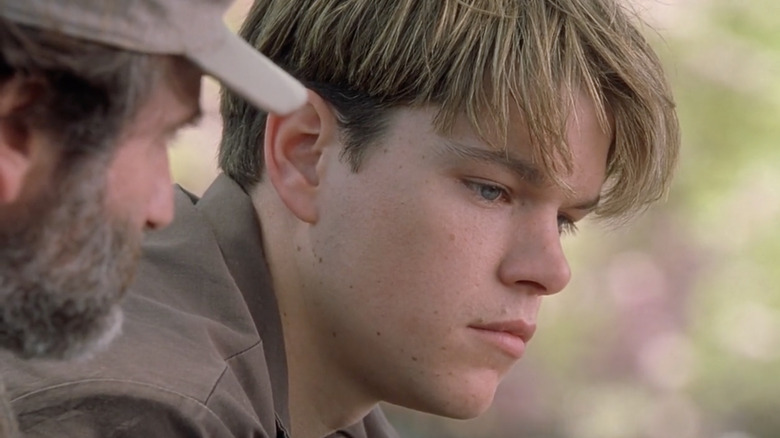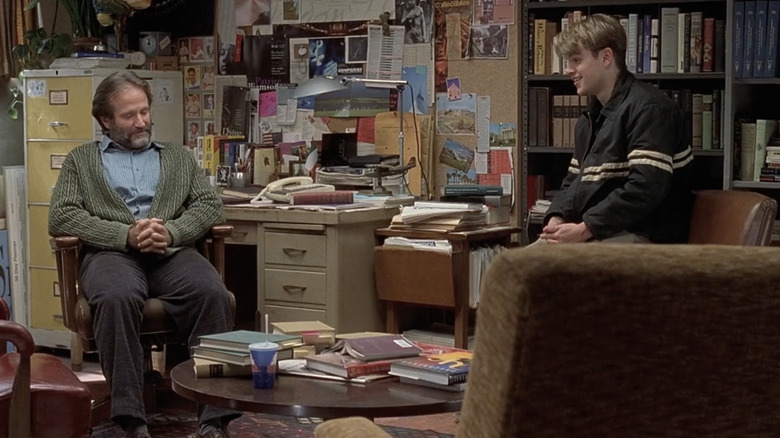Good Will Hunting Ending Explained: When You Gotta Go See About A Girl
In the 1990s, struggling actors Ben Affleck and Matt Damon penned "Good Will Hunting," and sold it to Miramax for over a million dollars. On top of writing the script, the pair starred in the 1997 film, alongside Robin Williams and Stellan Skarsgard, and proved they could hold their own in front of the big names. The movie was nominated for nine Oscars and won two: Best Original Screenplay went to Damon and Affleck and Best Supporting Actor went to Robin Williams. Not bad, considering it was competing against "Titanic" earning 14 Oscar nominations that same year.
The film overflowed with on-screen talent, but Affleck and Damon's story made it successful. At first glance, "Good Will Hunting" is about a mathematical genius with a giant chip on his shoulder, who wastes his potential drinking in bars and fighting in the streets. Below the surface, the film is concerned with trauma and the ways it affects the lives of survivors.
Will Hunting
Will Hunting (Damon) works as a janitor at M.I.T. despite his genius-level IQ. When his mathematical abilities enable him to solve a difficult equation, mathematician Professor Lambeau (Skarsgard) wants to recruit him, but Will claims to have no interest in academics. After starting a street fight with his rowdy friends, he agrees to work with Lambeau and see a psychiatrist to avoid jail time. Will helps with the math, but he treats therapy like a joke.
He mocks and teases his first two assigned psychiatrists so badly that they refuse to work with him, but then he meets his match with a community college professor named Dr. Sean Maguire (Williams). The two get off to a rocky start, which ends with Sean's hand around Will's throat, but they slowly become friends. Will also meets and falls for Skylar (Minnie Driver) a pre-med student at Harvard, but he pushes her away when she attempts to get too close.
Through Will's increasingly revealing therapy sessions, we learn that he grew up in very abusive foster homes, where he was regularly beaten with a wrench. This trauma leaves him with low self-esteem and a fear of abandonment that affects every aspect of his adult life. He believes that he's not worthy of success, so he thumbs his nose at every career opportunity he's given. He's also convinced he can't be loved and that people will always hurt and leave him, which is why he pushes Skylar away when things get heavy.
Throughout their discussions, Will learns that he and Sean have a lot in common, including being stuck in the past. Sean avoids potential relationships because of the death of his wife, and Will avoids any potential for failure because of his childhood traumas. But they help each other overcome these fears.
'I gotta go see about a girl'
When Sean pushes Will to pursue a career with his abilities, Will calls him out for being a hypocrite that refuses to move on with his life after the loss of his wife, which leads to a big life change for him in the end.
During one of Will's sessions, Sean recounts missing an historical Red Sox World Series game with his friends so he could have a drink with a woman who later became his wife. He recalls telling them, "Sorry, fellas, I gotta go see about a girl." When Will hears this story, he laughs mockingly, but Sean explains he doesn't regret his decision:
"I don't regret the 18 years I was married to Nancy. I don't regret the 6 years I had to give up counseling when she got sick, and I don't regret the last years when she got really sick. I sure as hell don't regret missing the damn game."
It's an important anecdote for Will, who is terrified of being left by Skylar, and it leaves a life-changing impression on him.
At the end of the film, Sean has decided to travel the world in search of new happiness, and Will leaves South Boston for the first time in his life to be with Skylar in California. A note he leaves for Sean explains that he had "to go see about a girl." Sean's story gave Will the courage to seek love.
When Will and Sean met each other, they were both stuck in the past, and refused to do anything that might result in pain or failure. In the end, both of these characters overcame past traumas and fears, and felt secure enough to pursue happy futures.


